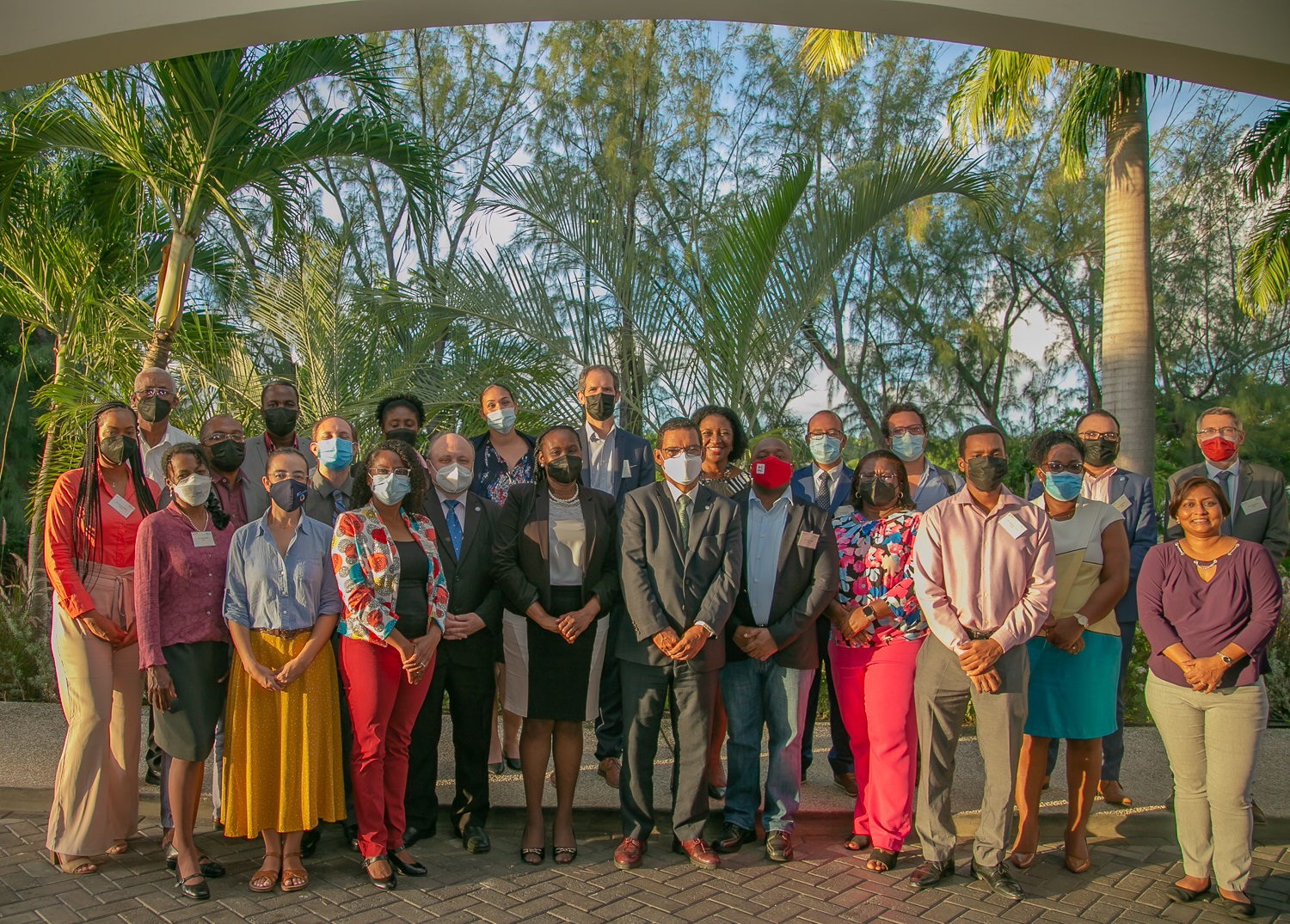After two days of in-depth exchanges of analysis, considerations, challenges, opportunities and potential strategies, the Caribbean has strengthened its partnership for the development of multi-hazard early warning systems.
On September 1 and 2, several regional and global organizations involved in supporting early warning systems in the Caribbean, as well as some NDMOs representatives from CDEMA Participating States gathered in Bridgetown, Barbados, for the Regional Early Warning Systems Consortium (REWSC) Meeting. The Consortium, chaired by CDEMA with the support of UNDRR and CREWS, is the perfect setting to explore complementarities and enhancing existing and potential institutional arrangements aiming to increase efficiencies through stronger coordination to address early warning systems for multiple hazards.
“Multi-Hazard EWS saves lives”, said Andria Grosvenor, Deputy Executive Director (ag). “In the Caribbean we have recognized there are a number of actions undertaken in order to save lives. This workshop has helped us to assess key needs to establish MHEWS. We recognize many countries still have many great challenges, but the main challenge, as a region, is to ensure all countries are brought up to speed on giving people adequate warning to save lives”, she added.
An efficient EWS shall reflect four (+1) components: Risk Knowledge; Monitoring and Warning Service, Dissemination and Communication, and Response Capability. All of them linked and harmonized through EWS governance. The Regional EWS Consortium, as a strategic and advisory body for the advancement and strengthened coordination of EWS within the Caribbean Region, promotes greater efficiency through the harmonization of these (4+1) components. The extent of these harmonization opportunities requires greater exploration within the Caribbean context.
Raúl Salazar, chief of the United Nations Office for Disaster Risk Reduction – Regional office for the Americas and the Caribbean, emphasized the importance of regional efforts. “Regional coordination becomes a must in order to strengthen regional, national and local capacities for early warning-early actions and local resilience. International and regional cooperation, and multilateral action remain essential to manage the global and systemic nature of disaster risk and to provide the necessary support to developing countries. The REWSC has been identified as a good study case on how regional organizations are coordinating and supporting countries on ensuring a multi hazard approach to Early Warning Systems”, he said.
During the meeting, REWSC’s members discussed about their existing and projected actions on (MH)EWS; the contextualization and updated of the MHEWS Checklist for the Caribbean region; reflected on existing EWS capacities and gaps in the region and in each of the countries; and, agreed to develop different activities and programmes to further strengthen MHEWS, including the finalization of an Strategic Roadmap for Advancing MHEWS in the Caribbean 2020-2030.
“The Caribbean has a lot of expertise that we can share with other regions”, ‘highlighted John Harding, head of the Climate Risk and Early Warning Systems (CREWS). “What is really interesting in this region is that they are using the work from predicting hurricanes to better predict other hazards which impact their population. This has been an important space to refine prediction on multiple hazards and reduce the impact they will have on their population, which will be actions to replicate in the rest of the world”, he added.
A presentation on how Saint Vincent and the Grenadines National Emergency Management Office used its governance mechanisms and activitate multiple early warning systems for different hazards happening cascading and consequently (Dengue, COVID19, Hurricane seasons, La Suffreire volcano eruption, and social hazards) set the tone on the importance of the work of this Consortium, and the support that it could provide to Caribbean countries.
“This has been an opportunity to take a step towards better preparation. Mitigation action is important, but we must also invest in prevention and in resilience in order to protect livelihood and assets”, said Didier Trebucq, UN Resident Coordinator (RC) for Barbados and the Eastern Caribbean, during the workshop. Last March, UN Secretary-General António Guterres was clear on the importance of EWS: “Early warnings and action save lives”. Guterres also urged the world to “spearhead new action to ensure every person on Earth is protected by early warning systems within five years”.
In 2022, the International Day will focus on Target G of the Sendai Framework: “Substantially increase the availability of and access to multi-hazard early warning systems and disaster risk information and assessments to people by 2030”.
The primary goal of the Sendai Framework is to avoid creating new and reduce existing risk. But when that is not possible, people-centered early warning systems and preparedness can enable early action to minimize the harm to people, assets and livelihoods. “One-third of the world’s people, mainly in the least developed countries and small island developing states, are still not covered by early warning systems. We need to enhance international support so that they can build and expand their early warning systems. Multi-hazard Early Warning Systems save lives and livelihoods”, has said Mami Mizutori, Special Representative of the UN Secretary-General for Disaster Risk Reduction.
The REWSC is an excellent study case of governance mechanisms on how regional and global organizations coordinate actions aiming to increase the efficiency of EWS with a multi-hazard approach in the context of systemic risk and complexity.

Partners and members of the Regional Early Warning Systems Consortium who took part in its relaunch on September 1-2, 2022 at the Courtyard at Marriott Hotel in Bridgetown, Barbados.
From the desk of Luis Luis Burón B.
Asistente de información y comunicación / Information and communication assistant
[email protected] Tel : +507 3171120 Cell : +507-61504806
Skype: buronbarahona
UN Office for Disaster Risk Reduction (UNDRR), Regional Office for the Americas and the Caribbean.
